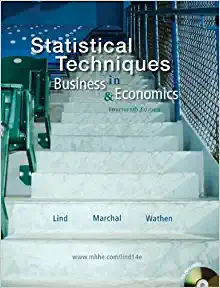Question
Acquire the direct pattern condition for the accompanying information on new financial records at Fair Savings Bank and use it to anticipate expected new financial
Acquire the direct pattern condition for the accompanying information on new financial records at Fair Savings
Bank and use it to anticipate expected new financial records for periods 16 through 19.
Period New Accounts Period New Accounts Period New Accounts
1 200 6 232 11 281
2 214 7 248 12 275
3 211 8 250 13 280
4 228 9 253 14 288
5 235 10 267 15 310
b. Use pattern changed smoothing with = .3 and = .2 to smooth the new record information to a limited extent a.
What is the gauge for period 16?
Given this straight programming model, address the model and afterward answer the inquiries that follow.
Amplify Z = 12x1 + 18x2 + 15x3 where x1 = the amount of item 1 to make, and so forth
Subject to
Machine 5x1 + 4x2 + 3x3 160 minutes
Work 4x1 + 10x2 + 4x3 288 hours
Materials 2x1 + 2x2 + 4x3 200 pounds
Item 2 x2 16 units
x1, x2, x3 0
a. Are any imperatives restricting? Assuming this is the case, which one(s)?
A firm intends to start creation of another little machine. The supervisor should conclude whether to buy the engines for the apparatus from a merchant at $7 each or to deliver them in-house. Both of two cycles could be utilized for in-house creation; Process A would have a yearly fixed expense of $160,000 and a variable expense of $5 per unit, and Process B would have a yearly fixed expense of $190,000 and a variable expense of $4 per unit. Decide the scope of yearly volume for which every one of the options would be ideal.
A pipes fix organization has 3 workers and should pick which of 3 tasks to dole out each to (every representative is appointed to precisely one work and each work should have somebody doled out). Every representative can play out each work, yet the expense to play out some random occupation can differ. The accompanying table shows the expense for every worker to play out each work.
Worker A Employee B Employee C
Occupation 1 36 45 53
Occupation 2 36 47 37
Occupation 3 42 40 36
Tackle this task issue in Excel to track down the most reduced expense arrangement and answer the accompanying inquiries:
Which worker is alloted to work 1?
!!21!!
Which worker is doled out to work 2?
Which worker is doled out to work 3?
What is the base expense to finish every one of the three positions?
Step by Step Solution
There are 3 Steps involved in it
Step: 1

Get Instant Access to Expert-Tailored Solutions
See step-by-step solutions with expert insights and AI powered tools for academic success
Step: 2

Step: 3

Ace Your Homework with AI
Get the answers you need in no time with our AI-driven, step-by-step assistance
Get Started


